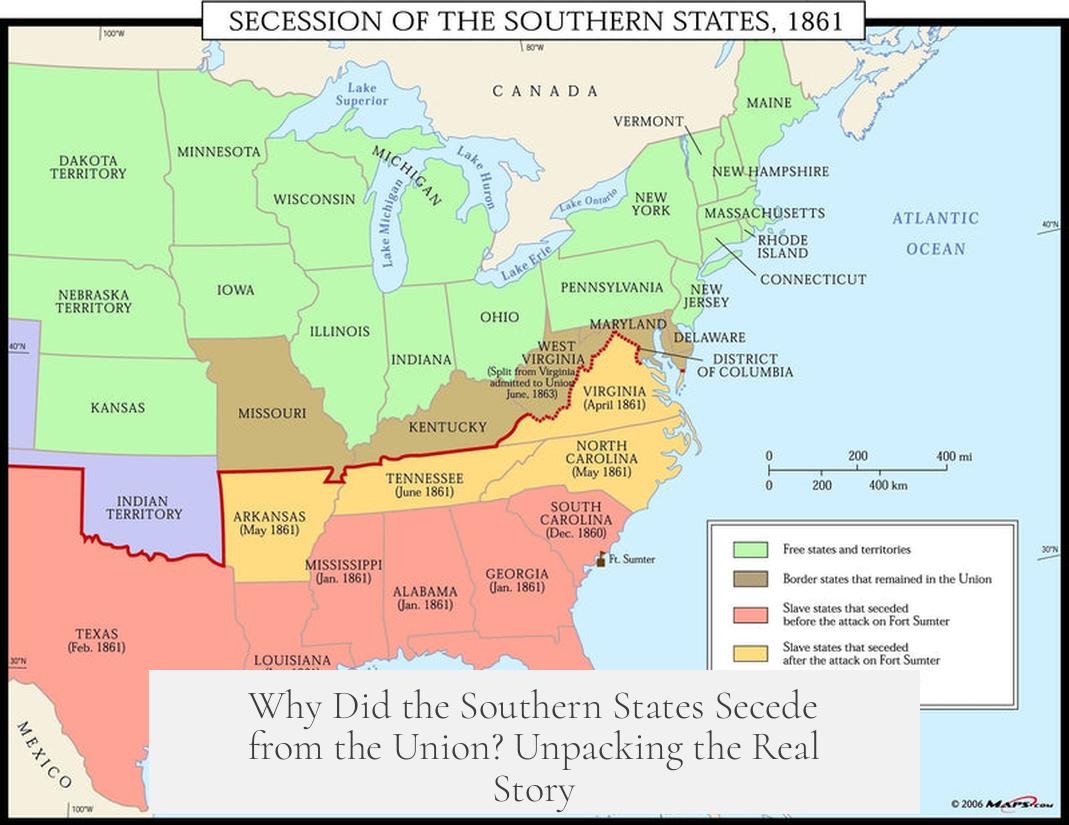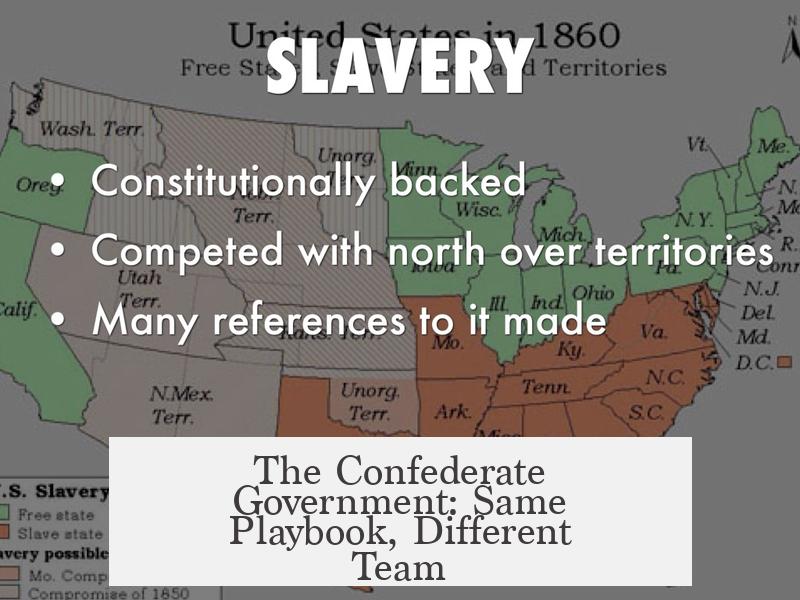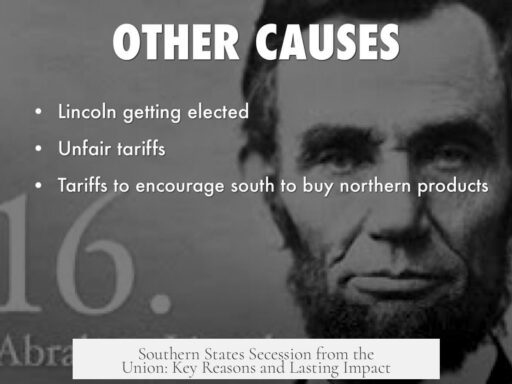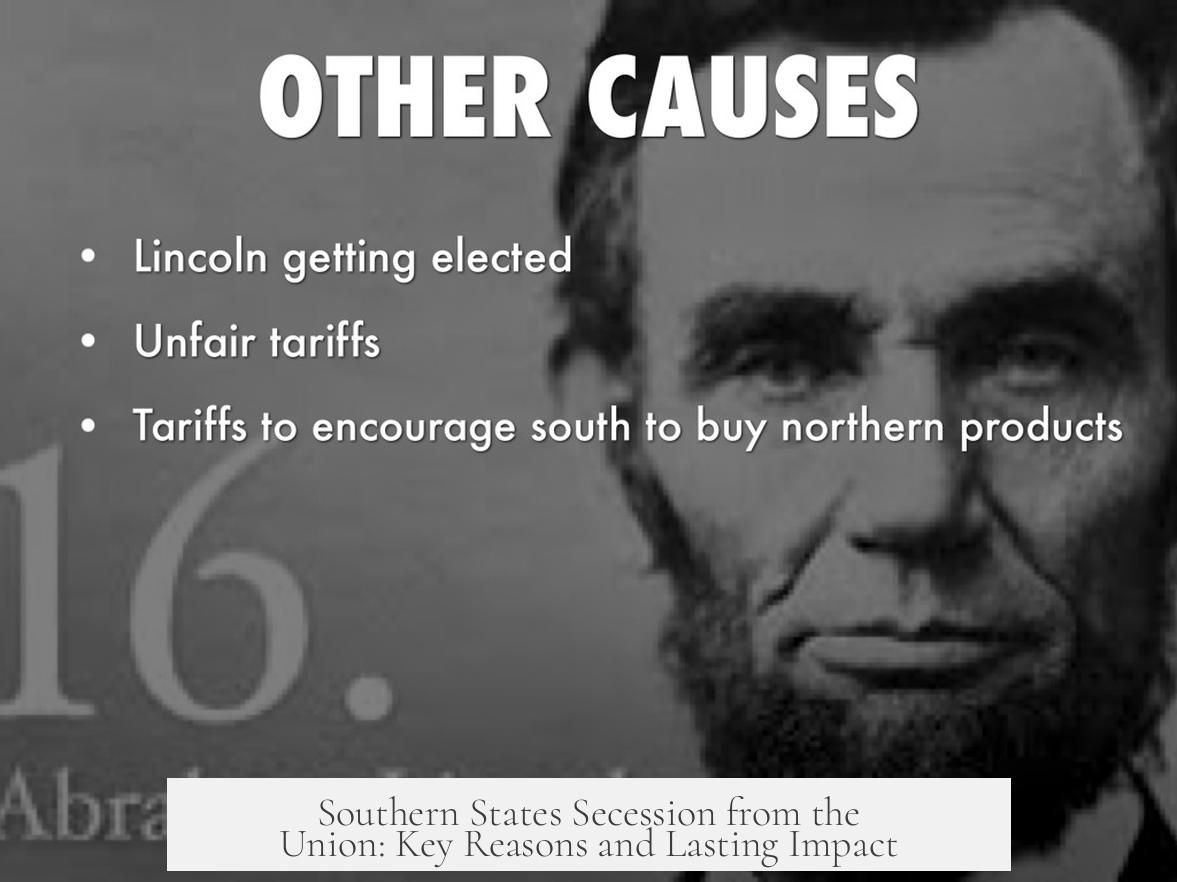The Southern states seceded from the Union primarily to preserve the institution of slavery. This cause is clear and central, reflected in their own declarations and documents. Slavery was not an incidental grievance but the fundamental reason behind secession in economic, political, and social terms.
Southern states viewed slavery as essential to their economic system and way of life. They believed abolitionist pressures threatened their property and social order. This belief led them to break from the Union to protect slavery interests.
Arguments that the Civil War started over tariffs, economic differences, or states’ rights in general are not supported by evidence from Southern declarations. Tariffs did not significantly harm the South. The region actually enjoyed low tariffs until just before the war. Economic distinctions between the industrial North and agrarian South existed but were tied to slavery, not independent causes. The states’ rights argument was focused narrowly on the right to own slaves, not a broad political principle.
Southern leaders and states explicitly cited slavery in their secession declarations as the cause for leaving the Union. Examples include:
- South Carolina: Cited “hostility” from non-slaveholding states toward slavery and disregard of constitutional obligations protecting it.
- Georgia: Complained about non-slave states opposing slavery and threatening the South’s interests.
- Mississippi: Declared its position “thoroughly identified with the institution of slavery,” calling it a “blow at commerce and civilization” when threatened.
- Texas: Emphasized protecting slavery as a constitutional right and complained of federal failure to enforce slavery laws.
- Alabama: Blamed the election of Abraham Lincoln and his party for hostility to domestic institutions, meaning slavery.
- Arkansas: Highlighted slavery extension as vital to its survival, contrasting Northern opposition to slavery with Southern acceptance.
- Florida: Described slavery as the basis of all property value and condemned Northern opposition as fanatical and destructive.
These explicit statements confirm that slavery was the key grievance driving secession.
Even the Confederate States’ government reinforced this focus. The Confederate Constitution resembled the U.S. Constitution but omitted any mention of the right to secede, indicating secession was seen as a last resort in defense of slavery rather than an assumed state right.
The focus on slavery was not merely rhetorical; Southern states clearly acknowledged that their economic and social order could not exist without it. The perceived threat from abolitionist policies and non-slaveholding states forced their hand.
| Misconception | Fact About Southern Secession |
|---|---|
| Tariffs caused secession | Southern states enjoyed some of the lowest tariffs and did not cite tariffs as a reason. |
| States’ rights in general | States’ rights argument focused specifically on protecting slavery, not broad sovereignty. |
| Economic differences independent of slavery | Economic differences were inseparable from slavery-based agriculture in the South. |
The Southern states’ decision to leave the Union was deliberate and directly related to slavery’s preservation. This is confirmed by their own words and official documents. Other popular excuses or causes for secession do not hold up to scrutiny.
- Slavery was the core cause of secession.
- Southern declarations explicitly blame threats to slavery.
- Tariffs, economic differences, and vague states’ rights claims are secondary or false causes.
- The Confederate government’s actions reflect a commitment to slavery’s protection.
Why Did the Southern States Secede from the Union? Unpacking the Real Story

The Southern states seceded from the Union primarily to preserve and protect the institution of slavery. It wasn’t about tariffs, states’ rights in the broad sense, or even economic differences between North and South. These are common myths that popular conversations sometimes repeat. But the history, including official documents and declarations from the time, makes one thing crystal clear: slavery lay at the heart of the Southern decision to leave the Union.
Let’s take a deeper and clearer look at this critical moment in United States history.
Slavery: The Unshakable Cause of Secession
Slavery shaped the Southern economy, society, and politics — it was the foundation of everything. Southern states relied on slave labor to fuel their agricultural economy, especially the production of cotton, which was a linchpin for their wealth. Beyond economics, slavery represented a social order and power structure the South desperately wanted to maintain.
So why the fuss? Why leave the Union? It all traces back to growing Northern opposition to slavery. As abolitionist sentiment strengthened in the North, many Southern leaders saw their entire way of life under direct threat. The fear wasn’t just abstract—it was a tangible risk to their property and social order.
Official declarations from seceding states don’t beat around the bush. South Carolina, for example, states plainly, “an increasing hostility on the part of the non-slaveholding States to the institution of slavery, has led to a disregard of their obligations.” This wasn’t vague political mumbo jumbo—this was a pointed accusation that the North was breaking its pledge to respect slavery.
What About Those Other “Causes”?
| Claimed Cause | Why It Doesn’t Hold Up |
|---|---|
| Tariffs | Southern states had some of the lowest tariffs in the U.S. until right before secession. Tariffs weren’t a pressing grievance. |
| Economic Differences | While economies differed, it wasn’t a deal-breaker. Both sides had coexisted with these differences for decades. |
| States’ Rights (General) | Proponents accepted federal laws like the Fugitive Slave Act that overrode state rights. States’ rights were a tool to protect slavery, not a broad principle. |
| Nullification Theory | A legal theory revived mainly to defend slavery; it never gained real traction or widespread acceptance. |
These points often get tossed around to muddy the waters, but historians agree: slavery was the real driver. The “states’ rights” rally cry? It was really about securing “the right” to own slaves.
Voices from the Seceding States: Declarations That Speak Loud and Clear
Each Southern state that left the Union issued a declaration spelling out why. The constant theme? Slavery.
- Georgia: Complains repeatedly about Northern states opposing African slavery.
- Mississippi: Calls slavery “the greatest material interest of the world” and says a blow at slavery is a blow at civilization itself.
- Texas: Proudly states it was received into the Union holding slavery and intends to keep it forever.
- Alabama: Blames Lincoln’s election by a party hostile to the institution of slavery for causing their secession.
- Arkansas: Points out the vital issue is the extension of slavery versus its extinction.
- Florida: Explains property in slaves is guaranteed by the Constitution and says destruction of slavery would destroy all of its property value.
Notice what’s missing in these powerful statements? Very little talk about tariffs, general state sovereignty, or economic clashes not linked to slavery. The Southern leaders were singularly focused.
The Confederate Government: Same Playbook, Different Team

When the Southern states formed the Confederate States of America, they went out of their way to mimic the U.S. government’s structure. Why? Familiarity and legitimacy. But oddly, the Confederate Constitution does not mention the right to secede—a curious omission, if one thinks secession was a “given right.”
More importantly, the Confederate Constitution explicitly protected slavery. It guaranteed the “right” to own slaves and forbade any law denying or impairing this institution. The South set up a government to safeguard slavery with all legal force.
Why Does This Matter Today?
Understanding why the Southern states seceded matters for more than just academic reasons. It cuts through myths that cloud public discussions even now. Misrepresenting the cause diminishes the lived experiences of enslaved people and obscures the fundamental conflict that led to the bloodiest war on American soil.
Moreover, by recognizing that slavery was the core issue, we acknowledge the real stakes at play. The South was fighting not just for political autonomy but fiercely to preserve a brutal system of human bondage. This brutal truth defines much of American history before, during, and even after the Civil War.
How Should We Talk About This Subject?
Discussing secession and the Civil War requires honesty and clarity. Instead of balancing “both sides” like they were equally valid, we can see secession as a deliberate decision to protect slavery.
Next time the topic pops up—maybe over dinner or a casual debate—ask yourself or others: “What did those states say was their reason for breaking away?” The answer is right there in black and white, in their own documents and speeches.
Final Thoughts
Throughout history, some narratives get rearranged like puzzle pieces to fit different agendas. But the facts are stubborn and clear in this case. The Southern states seceded from the Union explicitly to protect slavery. Their official declarations, political actions, and even their new government’s constitution all affirm this. It wasn’t tariffs, states’ rights as a broad principle, or economic differences—those were just distractions.
Slavery was the centerpiece, the irreducible core, the burning heart of the secession crisis. And knowing this keeps us honest about history’s truths.
Why was slavery the main reason the Southern states seceded?
The Southern states seceded because they wanted to protect slavery. Their economies and societies depended on it. Official declarations from these states name slavery as the key cause.
Did tariffs or economic differences cause the Southern states to secede?
No, tariffs were low for the South before the Civil War. Economic differences between industrial North and agrarian South were present but not the main cause. Slavery was the true issue.
Was the secession about defending states’ rights?
Not really. The South supported federal laws that enforced slavery, like the Fugitive Slave Act. Their focus was on preserving slavery, not on states’ rights in general.
What do Southern states’ declarations say about slavery?
States like South Carolina, Mississippi, and Texas explicitly blame the North’s hostility to slavery for their secession. Their documents make no real mention of other causes.
Did the Confederate Constitution guarantee the right to secede?
No, the Confederate Constitution did not mention secession as a right. This is surprising, given how important secession was to the Confederacy’s founding.



